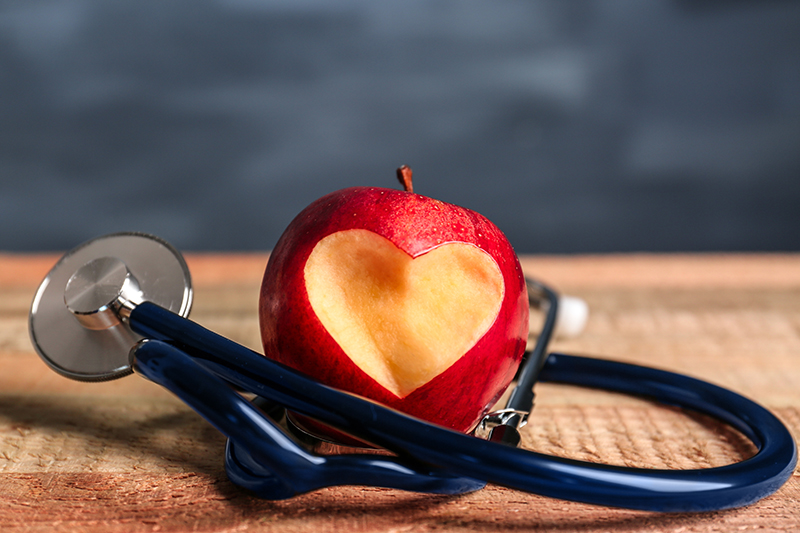9 Quick Fixes to Boost Your Fruit and Veggie Intake
 Here are nine easy ways to ensure you eat the recommended five to nine servings of fruits and vegetables every day.
Here are nine easy ways to ensure you eat the recommended five to nine servings of fruits and vegetables every day.
1. Eat on the go.
An apple, orange, banana, and pear are all portable fruits you can eat on the go without advance prep. Fruits provide vitamin C, a powerful antioxidant enhancing the body’s response to free radicals and protecting the arteries from oxidative damage.
2. Salads.
Shop the produce shelf for ready-made salads. Select dark green, leafy lettuce varieties, such as romaine, endive, and spinach.
3. Pizza.
Top your pizza with extra chunks of tomatoes, onions, bell peppers, spinach leaves, and pineapple. Tomatoes are rich in nutrients that directly impact heart health, including potassium, niacin, vitamin B6, and folate
4. Breakfast.
Use strawberries, bananas, blueberries and other fruits to pancakes, waffles, and toast. Colorful berries are a rich source of polyphenols and antioxidants.
5. Vegetable snacks.
Snack on raw baby carrots, pepper slices, cauliflower, broccoli, and celery. Cardiac physician Mark Houston recommends consuming 4 stalks of celery daily.
6. Fruit snacks.
Keep one-serving size bags of dried fruit in your car or desk for a convenient and still healthy snack. A 1/4 equal one-serving of dried fruit.
7. Pasta and omelets.
Mix in frozen or fresh vegetables with your pasta and omelets. Canned vegetables are high in sodium, while frozen or fresh vegetables usually have no added sodium.
8. Soup and sauces.
Boost nutritional value of soups and sauces by adding a kidney beans, green beans, corn, or peas. Beans provide both soluble and insoluble fiber to promote healthy cholesterol levels.
9. Smoothies.
Enjoy a healthy, refreshing smoothie made with frozen fruit, yogurt, and ice. Add a tablespoon of ground flaxseed to boost omega 3’s.
Remember… your goal is to consume 5 to 9 servings of fruits and vegetables EVERY DAY.
5 Steps for Heart Health, Starting Now

On the road to heart health, start with weight control. Reaching and maintaining a healthy weight promotes overall health and prevents many diseases, including heart disease. Living with extra weight, puts an increased burden on your heart muscle. Being overweight or obese puts you at increased risk for high blood pressure, type 2 diabetes, certain cancers, and other health
Here are five additional steps you can take for heart health:
1. Exercise more.
Being inactive is a major risk factor for heart disease. Regular exercise, particularly aerobic exercise, has many heart related benefits. For example, exercise will strengthen your heart, improves circulation, and lowers blood pressure.
2. Cut back on salt.
Salt can hide in places you may not expect. Read food labels. For some individuals, a high sodium diet is linked to high blood pressure. High blood pressure puts excess work on the heart and can lead to stroke and heart failure.
3. Avoid trans fat.
Trans fat increase LDL cholesterol, increase triglycerides and lowers HDL cholesterol. The FDA no longer recognizes trans fats as “generally recognized as safe” for use in food. Read food labels and select heart healthy oil when cooking, such as olive oil or canola oil.
5 Steps to Achieve a Healthy Heart

You don’t have to begin a drastic diet in order to achieve your heart health goals. Big results can be achieved by improving your daily habits one step at a time.
Here are 5 steps you can implement now for a healthy heart:
Step 1 – Add fruits and vegetables to your daily diet
That’s right, I’m not telling you to eliminate a food, but to add foods. Fruits and vegetables are essential. Add fruit and/or vegetable to every meal or snack to boost your intake of this necessary food group. It’s estimated that our intake of vegetables is usually only 59% of what it should be and fruit only 42%.
Step 2 – Switch processed grains for whole grains
Continue reading
Are you young, active, consuming a healthy diet, AND still diagnosed with high blood pressure?
I’ve been receiving several questions related to this recently, so wanted to address it. Here’s an example of a question:
I am and always have been thin. I do not smoke, do not drink alcohol, eat a very healthy diet high in fruits/vegetables and low in processed foods, exercise daily, and get plenty of rest. I have been diagnosed with high blood pressure. What do I do?
In this situation the standard steps you need to take to lower high blood pressure do not necessarily apply. That doesn’t mean be lazy, don’t exercise, and eat a high fat diet. That means you need to work with your physician for a full evaluation/lab work to determine the cause of your high blood pressure, since you do not have the typical causes of high blood pressure (overweight, poor diet, etc.). Once this is known you’ll be able to outline a plan of action appropriate for your situation.
All the best,
Lisa Nelson RD
7 Natural Ways to Lower High Blood Pressure
http://lowerbloodpressurewithlisa.com
Steps to Lose Weight
Here are a few steps to promote weight loss:
- Increase physical activity throughout your daily routine (i.e. park further from your office door, take the stairs instead of the elevator)
- Cut back on dining out (i.e. pack a lunch for work)
- Keep fresh fruits and vegetables within reach
- Clean out your cupboards and eliminate foods that don’t support heart health
- Cut back on TV time (just how many hours do you log each day in front of the tv?)
The list of steps you can take to promote weight loss and reduce heart disease risk goes on and on. Take it one step and a time!
Receive 1-A-Week Weight Loss Tips at http://www.weightlosswithlisa.com.
All the best,
Lisa Nelson RD
https://www.lisanelsonrd.com



